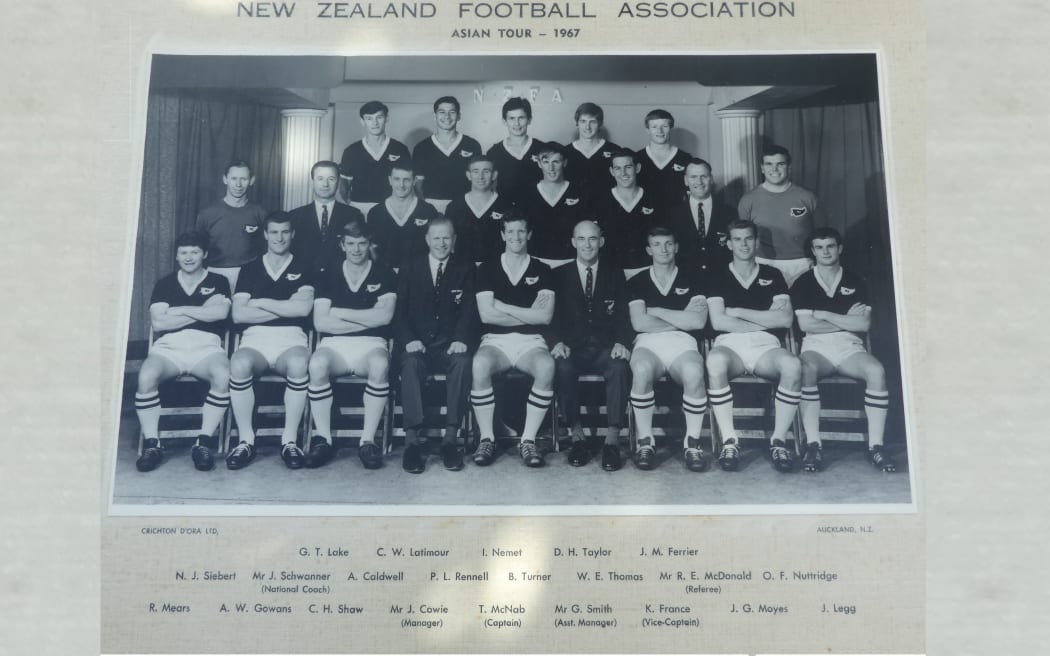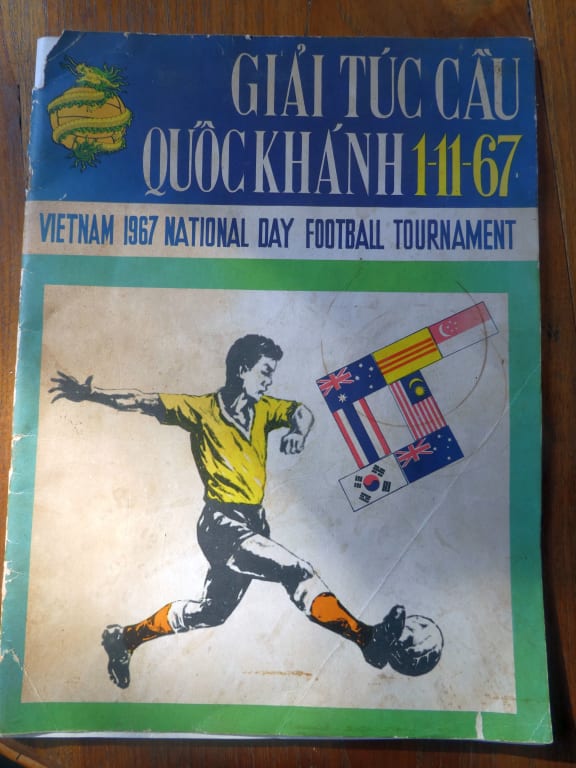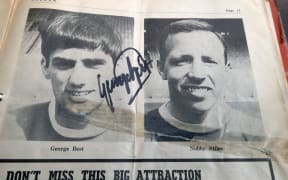
The team photo for the New Zealand football team that travelled to Vietnam during the conflict in that country. Photo: Supplied
While any All Blacks tour made front and back page news in the late 1960s, the New Zealand football team flew under the radar while visiting Vietnam in 1967 for a tournament in the war-torn country.
Football has been played in New Zealand since the 1880s, but it has been - to quote author Craig Stephen in his new book Boots and Bombs: How New Zealand Football grew up in the 1960s and 70s - a "long road to acceptance".
Stephen's history of New Zealand football takes a particular interest in the era when it really made inroads as a mainstream sport. He thinks it's a period of time that deserves more attention.

The programme booklet for the 1967 football tournament in Vietnam. Photo: Supplied
"As New Zealand sports fans, we obviously know about the 1982 campaign to get to the World Cup, but there's more to it than that. There were lots of adventures, overseas tours, visits by international teams, the start of the National League and all sorts of things. There's a whole load of characters involved."
Some of those characters were involved in a tournament long forgotten in the annals of New Zealand sport, when the national team - not yet called the All Whites - played three games in Vietnam in 1967.
The cash-strapped nature of the trip was summed up by the squad's official farewell reception at Auckland's Great North Hotel, where the NZ Football Association made the players pay for their own drinks.
In Boots and Bombs, in a chapter titled 'Going to War', Captain Tom McNab is quoted as saying: "We hope we come back from Saigon with….", and after a timely pause, "We hope we come back from Saigon".
The book leaves the reader scratching their heads at the potential threat to players, says Stephen.
"The Viet Cong had attacked sporting venues with deadly accuracy. Two years earlier a bomb exploded in the same stadium the tournament was being held. It seemed almost too good a target for the Viet Cong to turn their noses at. They even had the open goal of one hotel hosting every team throughout the tournament."
Stephen says it was dangerous, and ambitious.
"The tournament was called the Vietnam Independence Day Cup and invited several teams, all allies of the South Vietnam government. Eight teams came and were told that Saigon was quite safe, and that was the reason that New Zealand football decided to go. 18 kiwi players went over to Vietnam. They played three games. The first one was against Australia, which they lost. They beat Singapore, and then lost to South Vietnam and were knocked out of the competition."
- More from Boot and Bombs: When Manchester United came to play in NZ
Most of the players spent their time between training and matches enjoying Saigon's famous bars and clubs while hanging out with other teams in the tournament.
The closest they came to a fatality was teenager David Taylor's brush with a bad illness. The book describes his predicament in depth, and Stephen says it was touch and go.
"He only played part of a match. He was just 17. He got very, very sick. He picked up something and described it in lurid terms. He said it was like The Exorcist. He was puking all over the bed. He was basically going to the toilet all the time and lost a lot of weight. He was taken to the hospital in Saigon and was in such a bad condition that the coach told the rest of the squad that he wouldn't survive.
"Poor Dave was basically left in bed in a hospital that wasn't very clean and suffered quietly. There was no one else from the NZ Football Association still there. He spent just over a week in the hospital and didn't have anyone really to talk to apart from two Vietnamese girls from the New Zealand embassy. He fought it on his own, pulled through and flew back to New Zealand by himself. It could have been much worse."
After recovering, Taylor went on to have an illustrious career, playing 47 times for his country. He also won the New Zealand Coach of the Year award in 1990.
During the age of long hair and sideburns, virtually all players at the top level were part-timers, fitting far-flung, underfunded tours overseas around their day jobs.
Anyone pulling on the national shirt needed a very understanding boss, says Stephen.
"The game has moved on and is much more professional than the 60s and 70s, when local bodies were at the helm. These people did a good job, but they were basically just doing the administration work in their spare time. The players did it mainly for the love of the game."
Stephen acknowledges the part played by players like Taylor, who almost died chasing their passion, and early tours to places like Vietnam.
"We should pay our respects to the past, because the game is in a good state these days. The early days really did set things up for the sport's popularity today."


